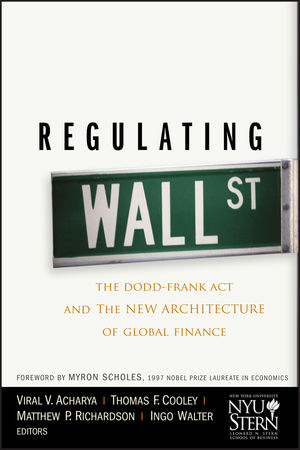Regulating Wall Street: The Dodd-Frank Act and the New Architecture of Global FinanceISBN: 978-0-470-76877-8
Hardcover
592 pages
November 2010
 This is a Print-on-Demand title. It will be printed specifically to fill your order. Please allow an additional 10-15 days delivery time. The book is not returnable.
|
||||||
—Gillian Tett, U.S. Managing Editor, Financial Times
"The crisis of 2008 confronted even well-educated Americans with
a flood of incomprehensible financial vocabulary, describing novel
financial institutions and practices most of us had never heard of
before. Now we have the 2,300-page Dodd-Frank Act, designed to
provide the needed repair. Will it do so? What else will it do? How
can we even start to think about these basic questions? Regulating
Wall Street addresses these questions in a clear, direct style,
taking us through the many parts of the Act one at a time, and
providing informed, cogent economic analysis of each. A valuable
standard source for future discussion."
—Robert E. Lucas, University of Chicago, 1995 Nobel
Laureate
"Take the faculty of one of the best finance departments in the
world. Ask them to analyze the new U.S. legislation on financial
regulation, and to think about what the new law gets right, what it
gets wrong, and how it is likely to shape the future of the
financial system. With a bit of luck, you get this very impressive
book. An absolute must-read."
—Olivier Blanchard, Chief Economist, International
Monetary Fund
"Regulating Wall Street goes a long way toward clarifying the
intent of the various provisions of the Dodd-Frank Act and
evaluating both its effectiveness and limitations. The need for
effective implementation by agencies is appropriately emphasized.
Not a quick read, a useful reference work on an enormously complex
piece of legislation, dealing with an even more complex financial
reality."
—Paul Volcker, Chairman of the Economic Recovery
Advisory Board and former Chairman of the Federal Reserve
(1979–1987)
“There are many villains in the story of the recent crisis
and much written to name them, describe them and even curse them. .
. If you want to know how to fix the problem, I highly
recommend ‘Regulating Wall Street,’ from New York
University’s Stern School of Business. . . In the
excellent book, ‘Regulating Wall Street,’ several of
the studies indicate that there are few synergies among financial
activities that could lead to economies of scope. The studies also
demonstrate that multiple functions in large, complex firms can
actually increase systemic risk. Moreover, they suggest that the
spun-off activities could thrive without explicit or implied
government support. The conclusion in this book is that
separating activities in this manner, together with stronger
resolution processes and better capital standards, would do much to
strengthen our financial system, making it more accountable and
stronger.”
—Thomas M. Hoenig, President, Federal Reserve Bank
of Kansas City
"Readers should read Regulating Wall Street to understand why, in the face of market failures and copious evidence that Wall Street is unproductive, Congress and regulators labored mightily to resurrect the financial intermediation racket just as it existed on September 12, 2008." (Tax Notes)
“If you want to know how to fix the problem, I highly
recommend Regulating Wall Street, from New York
University’s Stern School of Business.”
—Karl Denninger, Seeking Alpha
“One refreshing sign of hope for constructive change is
that economists, some of whose theories had much to do with a light
regulatory approach toward derivatives and the housing bubble, are
increasingly producing research calling for stricter guidelines
then Dodd-Frank or the Obama administration. Regulating Wall
Street presents a wide range of new research supporting
stronger regulations than Dodd-Frank recommends, such as . . . tax
proposals. . . In the prologue of Regulating Wall
Street, the editors, hardly known as progressives, remind
financiers how useful strong regulations were in the past. . . We
would be better off if the powers on Wall Street would remember. .
. “
(New York Review)



